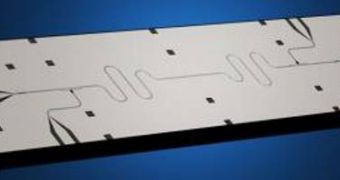For the first time ever, researchers from the Yale University have demonstrated a solid-state quantum processor, made of a two-qubit superconducting chip. The team behind the accomplishment also managed to run a few basic operations on the machine, such as a search query. Their work takes a major step forward in creating quantum processors for multiple applications that have the potential to essentially revolutionize the world. Details of the new device appeared in the June 28th advanced online issue of the journal Nature.
“Our processor can perform only a few very simple quantum tasks, which have been demonstrated before with single nuclei, atoms and photons. But this is the first time they've been possible in an all-electronic device that looks and feels much more like a regular microprocessor,” the Yale University William A. Norton Professor of Physics and Applied Physics Robert Schoelkopf explains.
Together with a team of physicists led by the Yale Eugene Higgins Professor of Physics and Applied Physics Steven Girvin, Schoelkopf's researchers have succeeded in creating two solid-state qubits, which are the basic unit in quantum computing, similar to bits on average processors. But, while the latter can only exist in the “1” and “0” positions (“on” or “off”), the former benefit from the counter-intuitive quantum mechanical law of superposition, which means that they can exist in a variety of states at the same time.
That is to say, because the qubits can essentially be “1”, “0”, or “1 and 0” at the same time, a host of applications becomes possible, once the device is further refined. Imagine having four telephone numbers, and not knowing which one belongs to the person you want to call. Rather than calling all the numbers, and speaking to each person at the other end of the line, you will call all at once, but the quantum processor will ensure that you only get through to the one you need.
“Instead of having to place a phone call to one number, then another number, you use quantum mechanics to speed up the process. It's like being able to place one phone call that simultaneously tests all four numbers, but only goes through to the right one,” Schoelkopf further explains.
A major hurdle that prevents this area of research from taking off is, at this point, the life span of qubits. When they were first created, some ten years ago, they lasted for a mere nanosecond, while they now endure for a microsecond. This 1,000-time increase in life span means that the units can run simple and basic algorithms, but the goal in quantum computing is now making the qubits last a lot longer than that. “We're still far away from building a practical quantum computer, but this is a major step forward,” Schoelkopf concludes.

 14 DAY TRIAL //
14 DAY TRIAL //